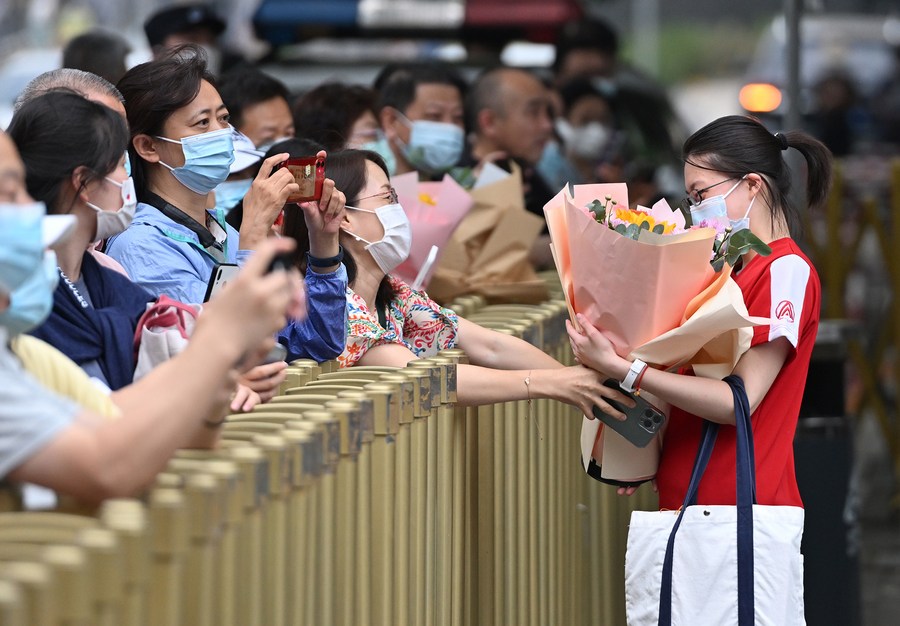Education matters in China
- ?By George N. Tzogopoulos
 0 Comment(s)
0 Comment(s) Print
Print E-mail China.org.cn, August 2, 2022
E-mail China.org.cn, August 2, 2022

Education is the principal foundation for a country's progress. China gives high priority to education development to nurture young people and cements an ambitious and promising way forward. Reform and innovation have been treated as pivotal for years. The universalization or popularization of the process is contributing toward the desired direction. The more the Chinese youth has access to education the easier strategic goals can be realized. The National Plan for Medium and Long-term Education Reform and Development 2010-2020 already acknowledged an asymmetry between the demands of the people and the educational methodology and capabilities at the time. It therefore functioned as a blueprint to allocate resources and achieve fairness and equality as well as a substantial improvement.
In 2015, "Quality Education" was categorized by the UN as a Sustainable Development Goal (SDG). The purpose is to promote lifelong learning and enhance access to education that is illustrated as "key to escaping poverty." China, which at that time was accelerating its titanic effort to alleviate poverty, could not but find a better incentive. As a matter of fact, its national goals acquired a strong international dimension. In the aftermath of the launch of SDGs, China organized several conferences in coordination with relevant UN agencies. In 2017, for instance, the city of Sanya in China's Hainan province hosted the international conference of the UNESCO associated schools network.
China's emphasis on strengthening education led to the publication of two development plans at the beginning of 2019. The first deals with the modernization of the sector until 2022, whereas the second designs a long-term vision and outlines ideas until 2035. On the whole, the Chinese modernization strategy aims to strike a balance between universal enrollment in primary and secondary education (especially by eliminating inequalities between urban and rural areas), the subsequent registration of students in higher education or vocational training programs, and the integration of those programs into the updated industry standards. According to the Chinese Ministry of Education, the enrollment rate to higher education increased from 30% in 2012 to 57.8% in 2021.
Continuity is highly significant as high-quality basic education serves as the basis for the raising of talents at a later stage. The Chinese government thus aims to support public schools to cover extracurricular activities in their normal services and re-organize and regulate private education. Against this backdrop, the 2022 report on the work of the government mentions that the homework load of students in compulsory education has been reduced, and the off-campus tutoring burden has been eased.
Additionally, the building of world-class universities is another critical element of the modernization strategy. Among other things, "the Double First Class Initiative" offers a financing scheme to promote talent training and measure their performance at selected universities. The first phase of the program was announced in 2016 and the second in February 2022. As technology and science are at the epicenter of attention, the contribution of artificial intelligence (AI) to education could not pass unnoticed. China's relevant next-generation development plan makes several references to the need to carry out AI education programs.
Although China is elaborating on, adjusting, and implementing education policies itself, it values international cooperation. International exchanges and collaboration, for example, are identified as the ninth goal of the 2035 modernization plan. Although the pandemic has seriously impacted physical exchanges, online synergies offered a temporary alternative in lockdown periods. Accordingly, China's interest in engaging with the world was recently outlined during the organization of the World Youth Development Forum in Beijing. Supported by UN agencies and other international organizations, the forum was an opportunity to exchange views on quality education and share the thoughts of young people across the globe.
As UN Secretary-General António Guterres' said in his video message: "There is no time to lose. Building a better future starts today. And it starts with you, the young people of the world." The Beijing Forum is expected to contribute to some of the preparatory work ahead of September's Transforming Education Summit under the UN aegis.
George N. Tzogopoulos is a columnist with China.org.cn. For more information please visit:
http://91dzs.com/opinion/GeorgeNTzogopoulos.htm
Opinion articles reflect the views of their authors, not necessarily those of China.org.cn.
If you would like to contribute, please contact us at opinion@china.org.cn.





